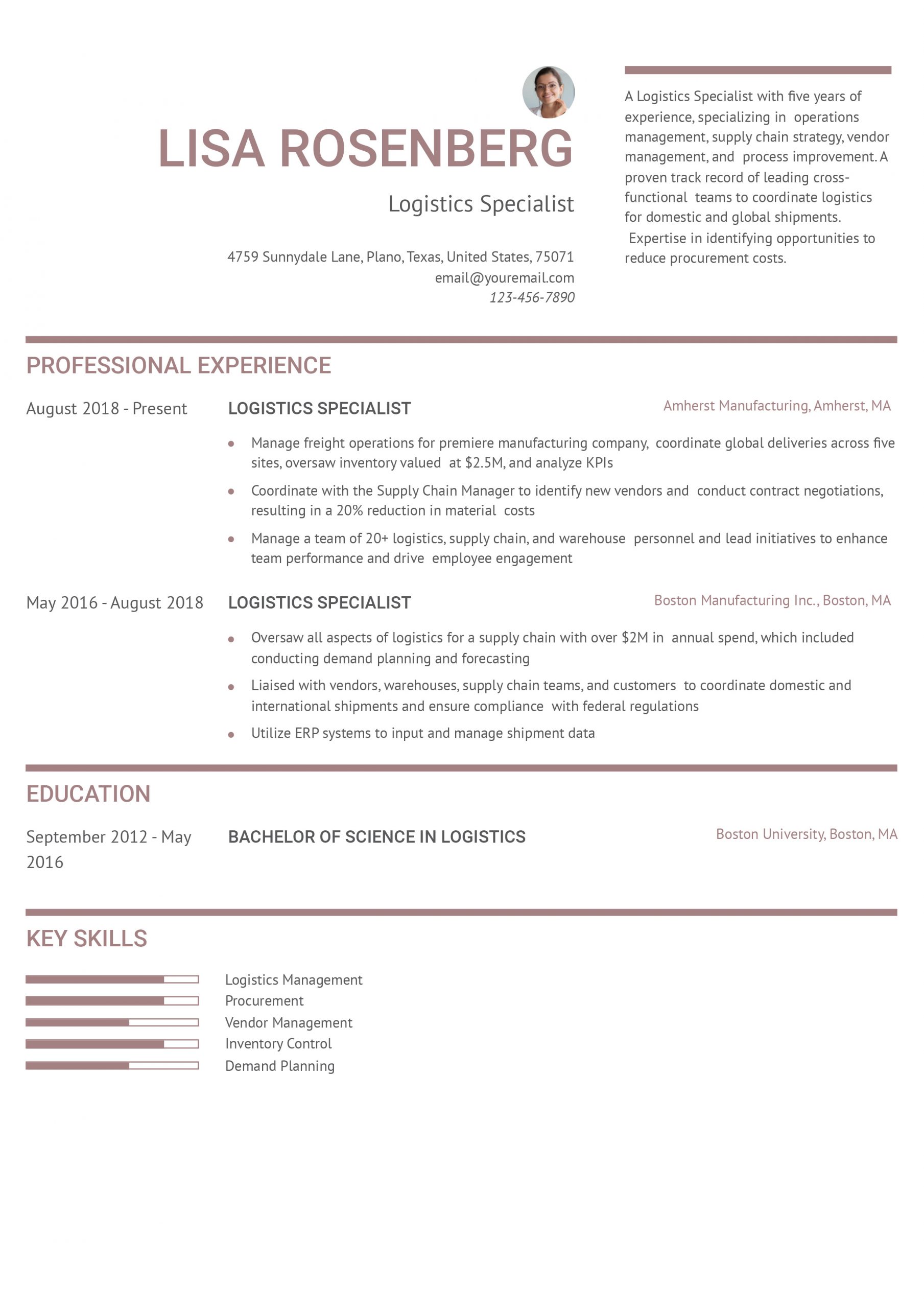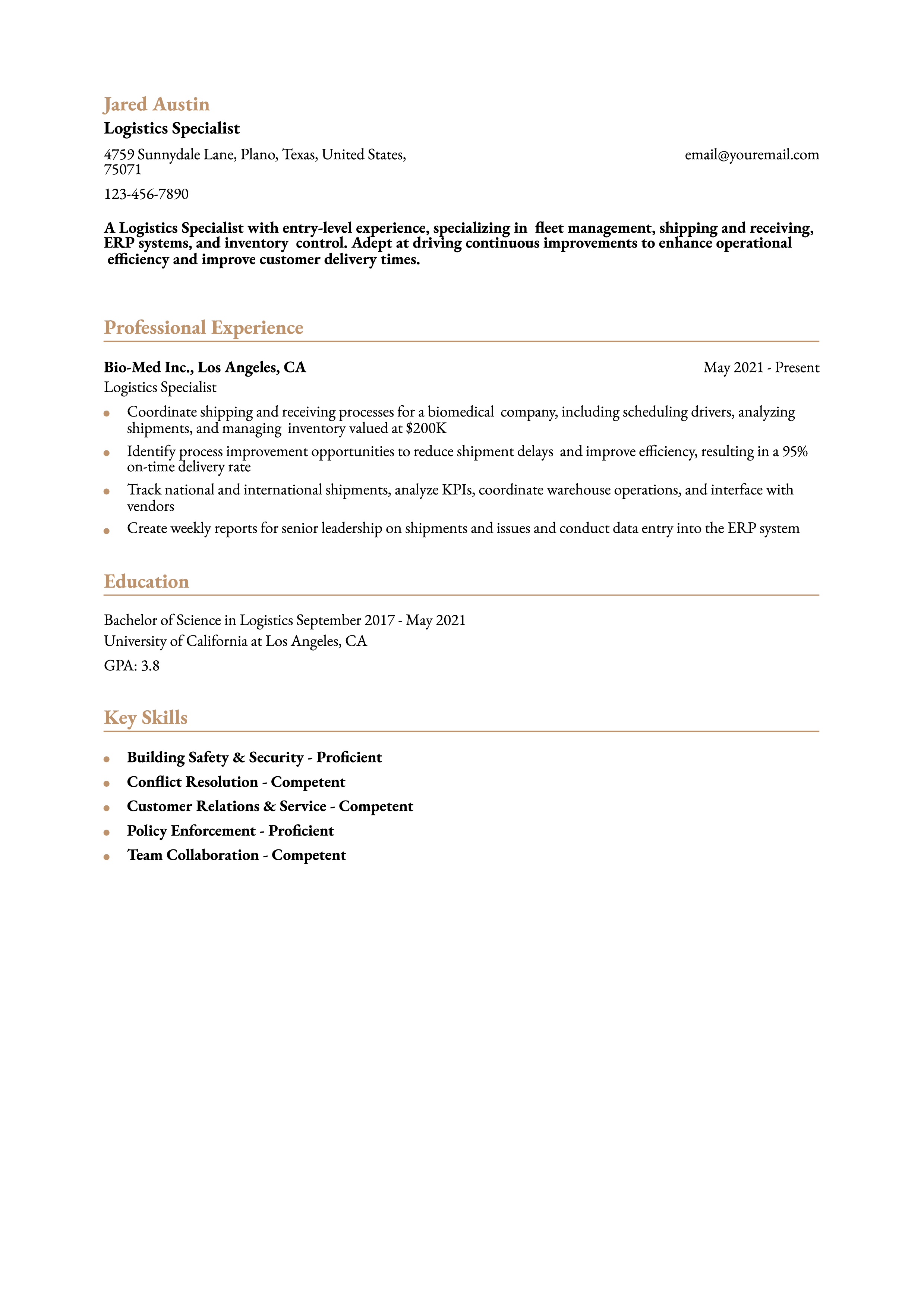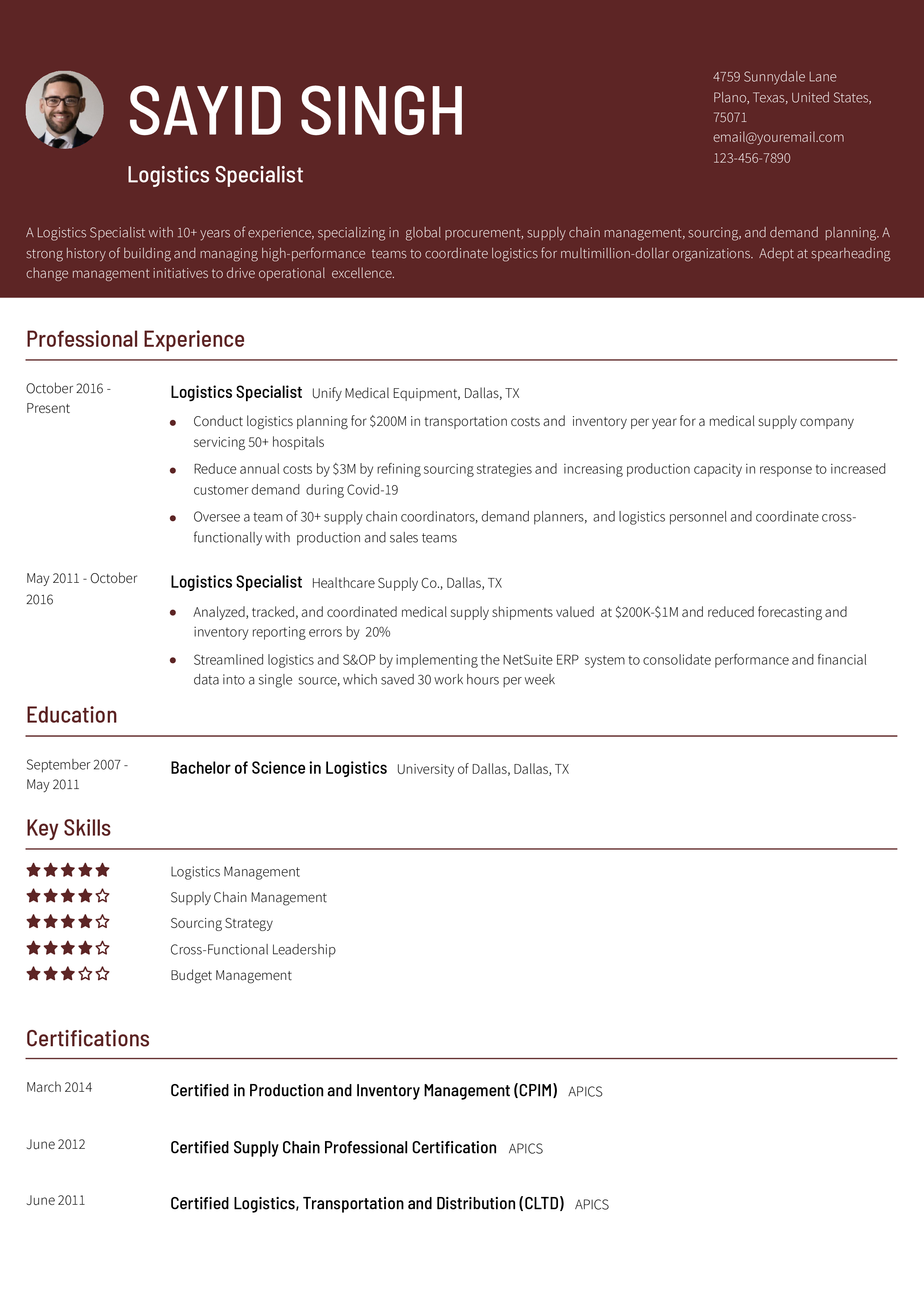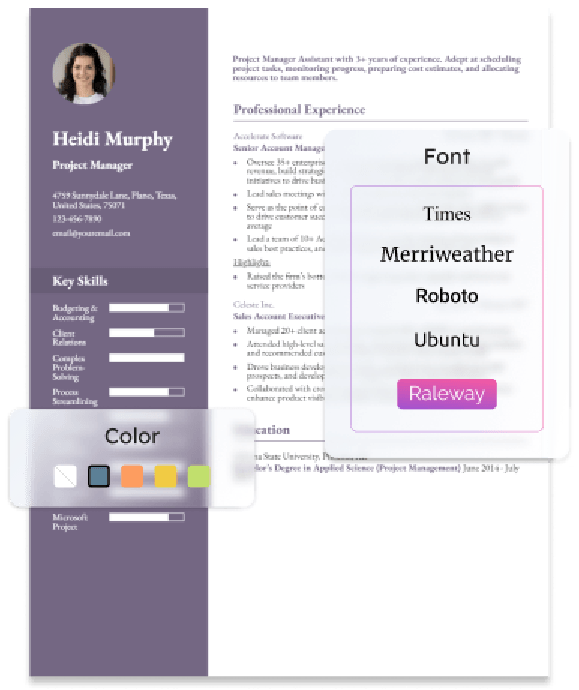- Entry-Level
- Mid-Career
- Senior-Level
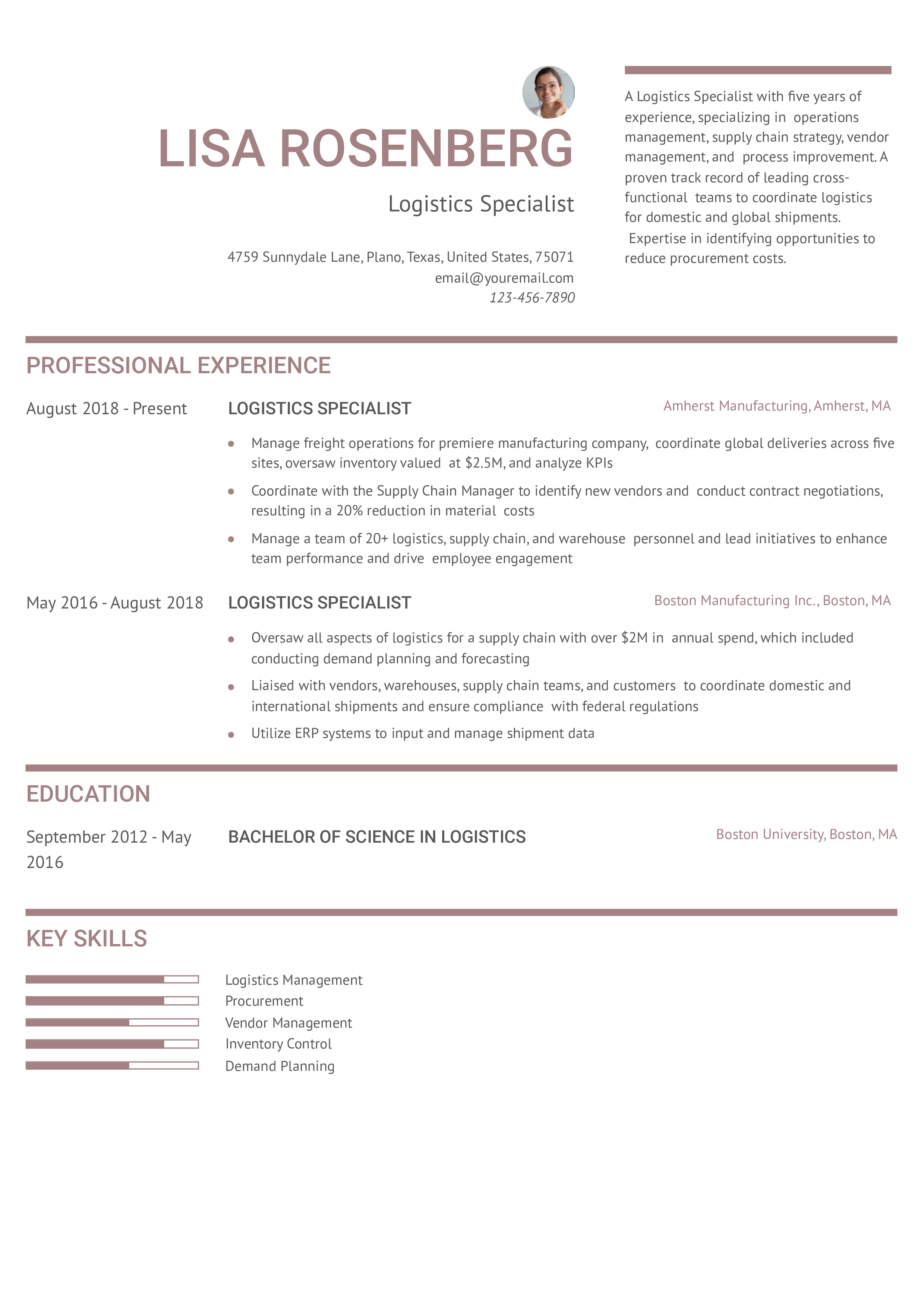
Logistics Specialist Text-Only Resume Templates and Examples
Lisa Rosenberg
(123) 456-7890
[email protected]
123 Your Street, Boston, MA 12345
A Logistics Specialist with five years of experience, specializing in operations management, supply chain strategy, vendor management, and process improvement. A proven track record of leading cross-functional teams to coordinate logistics for domestic and global shipments. Expertise in identifying opportunities to reduce procurement costs.
Professional ExperienceLogistics Specialist, Amherst Manufacturing, Amherst, MA
August 2018 – Present
- Manage freight operations for premiere manufacturing company, coordinate global deliveries across five sites, oversaw inventory valued at $2.5M, and analyze KPIs
- Coordinate with the Supply Chain Manager to identify new vendors and conduct contract negotiations, resulting in a 20% reduction in material costs
- Manage a team of 20+ logistics, supply chain, and warehouse personnel and lead initiatives to enhance team performance and drive employee engagement
Logistics Specialist, Boston Manufacturing Inc., Boston, MA
May 2016 – August 2018
- Oversaw all aspects of logistics for a supply chain with over $2M in annual spend, which included conducting demand planning and forecasting
- Liaised with vendors, warehouses, supply chain teams, and customers to coordinate domestic and international shipments and ensure compliance with federal regulations
- Utilize ERP systems to input and manage shipment data
Bachelor of Science (B.S.) Logistics
Boston University, Boston, MA September 2012 – May 2016
- Logistics Management
- Procurement
- Vendor Management
- Inventory Control
- Demand Planning
- APICS Certified Supply Chain Professional Certification (CSCP), 2018
- APICS Certified Logistics, Transportation and Distribution (CLTD), 2017
How To Write a Logistics Specialist Resume
To create a strong logistics specialist resume, you must highlight your experience navigating complex supply chains, managing vendor relationships, and improving operations. Showcase your ability to unlock value for your teams, clients, and organizations by developing key performance indicators (KPIs) or reducing procurement costs. This guide provides expert tips and insights to ensure your resume stands out in a competitive job market.
1. Craft an outstanding profile with a summary of your logistics specialist qualifications
To create an effective profile that captures the attention of potential employers, be concise and impactful. Using two to three sentences, briefly present your experience and achievements as a logistics specialist. Share the years you’ve spent optimizing supply chain operations, inventory control, and demand forecasting. As you write, incorporate relevant logistics and supply chain management keywords.
Use industry-specific language and keywords from the job description of the position you’re applying for. To engage the reader, include an impressive statistic highlighting your logistics specialist impact. Remember, your profile paragraph should present a short but powerful overview of your expertise, enticing hiring managers to continue reading your resume.
Senior-Level Profile Example:
A logistics specialist with over 10 years of experience, specializing in global procurement, supply chain management, sourcing, and demand planning. A strong history of building and managing high-performance teams to coordinate logistics for multimillion-dollar organizations. Adept at spearheading change management initiatives to drive operational excellence.
Entry-Level Profile Example:
A logistics specialist with entry-level experience, specializing in fleet management, shipping and receiving, Enterprise Resource Planning (ERP) systems, and inventory control. Adept at driving continuous improvements to enhance operational efficiency and improve customer delivery times.
2. Showcase your logistics specialist experience
An accomplishment-driven professional experience section should call attention to the influence you had and the value you brought to your previous organizations. Employers seek professionals who can efficiently optimize processes and deliver tangible results. Show them how you obtain desirable outcomes by quantifying your work experience.
Metrics and statistics will showcase your ability to analyze data, make data-driven decisions, and implement successful strategies. Give numerical examples of how you reduced procurement costs, improved delivery times, or exceeded customer satisfaction goals. As you write each bullet point, begin them with strong action verbs to add a dynamic element to your accomplishments.
Senior-Level Professional Experience Example:
Logistics Specialist, Unify Medical Equipment, Dallas, TX
October 2016 – present
- Conduct logistics planning for $200 million in transportation costs and inventory per year for a medical supply company servicing over 50 hospitals
- Reduce annual costs by $3 million by refining sourcing strategies and increasing production capacity in response to increased customer demand during COVID-19
- Oversee a team of over 30 supply chain coordinators, demand planners, and logistics personnel and coordinate cross-functionally with production and sales teams
Entry-Level Professional Experience Example:
Logistics Specialist, Bio-Med Inc., Los Angeles, CA
May 2021 – present
- Coordinate shipping and receiving processes for a biomedical company, including scheduling drivers, analyzing shipments, and managing inventory valued at $200,000
- Identify process improvement opportunities to reduce shipment delays and improve efficiency, resulting in a 95% on-time delivery rate
- Track national and international shipments, analyze KPIs, coordinate warehouse operations, and interface with vendors
- Create weekly reports for senior leadership on shipments and issues and conduct data entry into the ERP system
3. Include logistics specialist-related education and certifications
Employers value candidates who possess a strong educational foundation and specialized credentials. They can rest assured that you’ve received formal training and possess the necessary knowledge to excel in the field. In your education section, list your highest degrees or diplomas. Provide the degree or diploma name, institution, location, and graduation date.
In a separate section, list any certifications directly relevant to logistics and supply chain management. You could include certifications from The Association for Supply Chain Management (APICS), the Council of Supply Chain Management Professionals (CSCMP), or specific software and technology certifications. Format this section similarly, listing the certificate name, issuing organization, and date received.
Education
Template
- [Degree Name]
- [SCHOOL NAME], [City, State Abbreviation] [Dates Enrolled]
Example
- Bachelor of Science (B.S.) Logistics
- Boston University, Boston, MA September 2012 – May 2016
Certifications
Template
- [Certification Name], [Awarding Organization], [Completion Year]
Example
- APICS Certified Supply Chain Professional Certification (CSCP), 2018
4. Make a list of your logistics specialist-related skills and proficiencies
A key skills section acts as a powerful showcase of your capabilities and potential contributions to the logistics industry. As you make selections for your list, include skills from areas emphasized in the job description of the position you’re applying for. Be sure to feature any specialized skills you possess, such as expertise in handling international logistics, knowledge of customs regulations, or proficiency in implementing lean principles. Get a better idea of what you could include on your logistics specialist resume by exploring the examples below:
| Key Skills and Proficiencies | |
|---|---|
| Budget management | Client relations |
| Continuous improvement | Cross-functional leadership |
| Customer success | Data analysis |
| Demand planning | ERP |
| Fleet management | Forecasting |
| Inventory control | Inventory management |
| KPIs | Logistics management |
| Logistics planning | Operational excellence |
| Operations management | Process improvement |
| Procurement | Supply chain management |
How To Pick the Best Logistics Specialist Resume Template
A resume template serves as the foundation for presenting your qualifications clearly and visually appealingly. The best resume template for a logistics specialist has a clean and organized layout. It should have a clutter-free design that ensures your most relevant information is front and center.
Avoid excessive use of colors, graphics, or elaborate fonts that may distract from your content. Your resume should exude professionalism and attention to detail. By selecting a well-designed template, you’ll create a professional resume that effectively communicates your suitability for logistics positions and leaves a lasting impression on hiring managers.

1. What are the most in-demand skills for logistics managers that should be featured on a candidate’s resume? -
Logistics managers stand at the crossroads of technology and strategy. Hard skills may include an understanding of AI-driven logistics platforms, understanding of blockchain technology, and expertise in predictive analytics for supply chain optimization. Soft skills that are highly valued include dependability, problem solving, teamwork and collaboration, and a forward-thinking mindset. An outstanding candidate won’t just navigate the logistics landscape; they anticipate its turns, ensuring seamless operations in an evolving sector.
2. What work experience and other accomplishments are hiring managers looking for in a logistics manager?-
Hiring managers look for logistics managers with a proven track record in the logistics and supply chain industry. Highlight accomplishments like reducing lead times, optimizing inventory levels, and successful crisis management during supply chain disruptions. Additionally, any cross-functional collaborations that show leadership and the ability to work cohesively across departments will make you stand out. They may also value experience in implementing solutions for efficient logistics processes such as using AI.
3. What else in addition to a resume should a logistics manager candidate be prepared to provide hiring managers?-
In addition to a resume, logistics manager candidates should consider including a few extra items to their application to impress hiring managers. A compelling cover letter that shows your passion and achievements is a must. Additionally, a portfolio showcasing a specific logistics challenge you’ve overcome and/or highlighting key projects or tech implementations can really set you apart. Finally, be prepared for a possible test project to demonstrate real-time problem-solving and strategic skills. In this competitive landscape, it's all about standing out!
4. What advice would you give a logistics manager candidate about their job search?-
It’s important to remember that the logistics and transportation industry is evolving, fueled by technology and sustainability trends.
- Do your research on companies and choose ones that align with your passion, be it tech innovation or eco-friendly supply chain solutions.
- Networking is key, utilize online platforms and in-person events/meetings - the logistics community thrives on connections.
- Update your resume skills, especially in AI-driven logistics and data analytics.
- Finally, showcase adaptability - in this dynamic sector, your ability to pivot and embrace change could be your strongest asset.
Frequently Asked Questions: Logistics Specialist Resume Examples and Advice
How do I optimize my Logistics Specialist CV to get noticed by hiring managers?-
To optimize your Logistics Specialist CV, begin by showcasing measurable achievements that demonstrate the value you’ve brought to previous employers. Use action verbs and specific examples to highlight your contributions. Incorporating industry-specific keywords, particularly in the skills and professional experience sections, will help your CV stand out, especially with ATS systems.
What are common action verbs for logistics specialist resumes?-
We understand that finding the right words to capture the depth and impact of your past experience can be challenging. To help you overcome this block, we've created a comprehensive list of action verbs tailored specifically for logistics specialists. Action verbs are powerful tools that add a dynamic and impactful element to your resume. They enable you to concisely communicate your accomplishments and showcase your skills in a way that captivates potential employers. Consider using some of these power words below in your logistics specialist resume:
| Action Verbs | |
|---|---|
| Analyze | Coordinate |
| Develop | Drive |
| Enhance | Evaluate |
| Execute | Generate |
| Identify | Implement |
| Improve | Lead |
| Manage | Oversee |
| Optimize | Partner |
| Resolve | Spearhead |
| Support | Conduct |
How do you align your resume with a logistics specialist job description?-
According to the Bureau of Labor Statistics, logistician employment is projected to grow by 28% between 2021 and 2031, creating more than 54,000 new jobs over the decade. Although this industry has a high growth rate, you'll still need to build a solid resume to generate interviews in the open market. The key to separating yourself from other applicants is crafting a document that aligns with the job description of the role you're applying for.
Tailoring your resume is essential to increase your chances of standing out as a strong candidate. Study the job description and identify key skills and qualifications required for the role. Emphasize your expertise in supply chain management, data analysis, transportation, or inventory control using tangible examples from your career. Prioritize experiences that directly align with the position, and briefly describe how each role contributed to your overall skill set in logistics.
What is the best logistics specialist resume format?-
Reverse chronological is usually the most suitable resume format for logistics specialists. This approach highlights your consistent career progression, allowing you to showcase your growth, accomplishments, and increasing responsibilities over time. Presenting your work experience in reverse-chronological order helps to emphasize your most recent and relevant achievements.
The combination format, blending both chronological and functional elements, is an alternative to consider. Applicants can emphasize their skills and qualifications before detailing their professional experience. This could be a good choice for logisticians with limited experience or those looking to transition into a different industry.
Should my logistics specialist resume be one or two pages?-
Your logistics specialist resume should ideally be one page, especially if you have fewer than 10 years of experience. A two-page resume can be effective for seasoned professionals with a longer track record if it highlights accomplishments and skills directly relevant to the job. Every detail should add value and strengthen your candidacy.
Limit your work experience to the past 10 to 15 years, unless earlier positions are highly relevant. Keeping your resume concise and targeted will make a strong and memorable impression on potential employers.

Craft your perfect resume in minutes
Get 2x more interviews with Resume Builder. Access Pro Plan features for a limited time!
